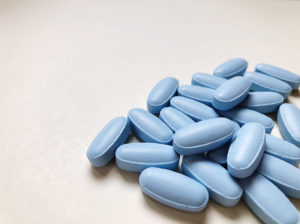Do I Have A Drug Addiction? Prescription Drug Abuse Quiz
Using prescription medication in a way that is not intended can lead to individuals becoming dependent and abusive towards the drug. It’s important to know the warning signs and symptoms to prevent addiction. If you’d like to know more take our free prescription drug abuse quiz and learn more.
Table of Contents
Drug abuse is on the rise in the United States, and it’s a bigger problem than you may think. Around 1 in 10 Americans will suffer from addiction at some point in their lives, and many prescription medications are fueling that rise.
Unfortunately, there are many gray areas when it comes to prescription drug abuse, which causes confusion for many people suffering from addiction. Hopefully, we can help you determine your situation with our prescription drug abuse quiz.
Take Our Prescription Drug Abuse Quiz
This self-test is not a diagnostic tool, nor is it intended to replace a proper diagnosis. Use it only for informational purposes. Substance use disorders should only be diagnosed by a licensed behavioral health professional or doctor. Regardless of your results from our assessment, you should speak to a doctor about your addiction.
Types of Prescription Drug Addiction
Briefly, let’s discuss what addiction is before we discuss the types of addictive medications.
No matter what the substance or legal status is, substance use disorder (SUD) is a neurological condition caused by a substance-induced chemical imbalance in the brain.
Essentially, your brain has important chemical compounds (called neurotransmitters) that it uses to feel pleasure, joy, calm, or anything else. Some substances replicate these functions in the brain, forcing your body to produce less of them or halt production altogether.
When that happens, your brain can’t feel “normal” without the presence of that substance, and it will rely on more and more of that substance as time goes on (tolerance) until your body has completely detoxed from the substance. From there, your body will continue to produce normal amounts of these chemicals.
With that being said, here are some of the most commonly prescribed substances that often lead to such a condition.
Often prescribed for pain management, opioids are among the greatest concerns when it comes to drug abuse in the United States. Opioids alone accounted for over 100,000 deaths in 2021 for the first time ever, and the problem isn’t getting better.
The most common medicines in the large opioid family include:
- Hydrocodone (Vicodin)
- Codeine
- Oxycodone (Oxycontin, Percocet)
- Morphine
- Meperidine (Demerol)
For street drugs, there are also heroin (diacetylmorphine) and fentanyl, both of which are far stronger than prescription opioids, as well as far cheaper and more accessible.
Moreover, these medicines and drugs work the same. They link to specific opioid receptors in our brains that can help block pain. Secondarily, they may result in a euphoric high.
However, they come with so many risks to our bodies, including addiction, overdose, long-term health conditions, dangerous withdrawal symptoms (as well as complications), and death.
If you’re thinking to yourself, “opioids are depressants”, then you are correct. However, they cover a wide variety of different medications and street drugs, which gives them their own category.
For other nervous system depressants, most fall under the umbrella of benzodiazepines, but not all. However, the most common benzodiazepines are used to treat anxiety, including:
- Diazepam (Valium)
- Lorazepam (Ativan)
- Clonazepam (Klonopin)
- Alprazolam (Xanax)
There are also antidepressants, including sertraline (Zoloft), along with several sleep aids. However, these are some of the most commonly prescribed depressants outside of the opioid family.
Most often used to treat sleep narcolepsy and ADHD, some commonly prescribed stimulants include methylphenidate (Ritalin) and amphetamine/dextroamphetamine (Adderall). Both of these are highly addictive and often prescribed to children and adolescents.
Signs of Prescription Drug Abuse
Of course, there are other drugs and medications that have addictive qualities. Also, you don’t even need a chemical addiction to form a dependence, which is just as serious as addiction and still requires treatment.
Also, there are a lot of different medications with addictive properties, which means that signs and symptoms are often different for everybody. However, some of these will ring a bell for anybody abusing substances.
After you’ve taken our quiz above, and you read through the signs, we will discuss where to go from there if you are concerned about addiction.
Using the Drug for the Wrong Purposes
When patients begin to take the drug out of boredom, craving, or just for fun, the problem often gets out of hand quickly.
If you start using your prescriptions for recreational purposes, it can easily lead to addiction, especially if you don’t spend much time away from the substance.
Sometimes, people take their prescribed medicines as a form of self-medicating. It sounds contradictory, but if you were prescribed something for one purpose, but you’re using it to treat another, that’s still a form of self-medication.
For example, if you received medicine for pain management, but you use it to forget about trauma, then that is self-medicating, which carries several risks.
Building a Tolerance
Now, any medication you use daily will lead to some level of tolerance buildup. However, if you find yourself using more of the substance than prescribed to feel the desired effect, then that’s a common sign of a forming addiction.
Trying Desperately to Get More
You likely received a prescription to last 30, 60, or 90 days. If so, how fast did you use it up? If you find that you are consistently running out of your prescriptions faster than intended, this may be a sign of addiction.
Similar to the last note, another concern may be if you believed you stopped needing the prescription for its intended purpose but lied to your doctor about it to receive more.
You wouldn’t be the first to lie to your doctor, as around 23% of people admit to the occasional lie. However, if you’re doing it to receive medication, you should be concerned.
If you’ve run out of your prescription early or stopped needing it for its intended purpose but still lied for more, it’s likely you have an addiction.
Finally, if you have ever tried to obtain similar drugs on the street or from loved ones because you’ve run out of your prescription (or it isn’t doing what you want it to), then it’s time to get help.
Whether you’re raiding people’s medicine cabinets or trying to buy from street dealers, it’s time to look into available treatment options.
Psychological Dependence
Many patients feel anxious if they don’t have their prescription with them all the time. They often feel as though they can’t function without it.
Of course, there is a fine line between legitimate use and drug abuse. If you need a medication to treat an attention disorder and you feel you rely on it to function properly, then you may not have an addiction.
However, for something like pain medicine and others, it should concern you if you feel that you need them to function mentally.
Withdrawal Symptoms
Sometimes, people recognize they overuse a substance and consider stopping. If you have tried to stop using a substance before and failed, it’s likely you have an addiction.
Whether you’ve tried to stop or not, going 24 hours or more without a medicine may lead to withdrawal symptoms which may make you feel sick.
Similar to building a tolerance, withdrawal symptoms are a serious sign that you have formed an addiction. If you haven’t been taking the medications long enough, or if you’ve never gone long enough without them, then you may not know if you experience withdrawals.
Don’t attempt to go without the medication to find out unless your doctor says that it is safe to do so. Depending on the medication, stopping abruptly may be ill-advised.
However, if you’ve ever forgotten to take your medication or tried to stop taking it, did it make you feel sick? If so, you likely experienced withdrawal symptoms, meaning that you have an addiction.
Loss of Interest
Often, those with SUD begin to neglect work, family, or social obligations after enough time. This can even include activities you love to do like hobbies, recreational activities, or relaxation time.
If you find you’re preferring social isolation, you’re letting things like hygiene slip under the radar, or you’re neglecting responsibilities, that’s a sign of addiction. If this sounds out of place, we promise it isn’t.
See, addiction is a disease much like depression or other common mental illnesses. It wants to control your life and make you forget about everything else, even the things you love.
Social Signs
Do you feel personally attacked when somebody brings up your drug use or asks too many questions about it? If talking about it is a cause of discomfort, that may suggest you have some issues with drug abuse.
If you’re reading this out of concern for a loved one, ask yourself if you remember repeated occurrences of lying about their whereabouts, spending time with unreputable people, missing important obligations, or acting differently in any way.
Because there are so many different drugs, this could appear as social isolation, excessive talkativeness, irritability, and a lot more.
Drug Abuse Treatment
If you answered yes to more than one of those, then chances are you have some type of substance use disorder. In that case, it’s time to talk about treatment options.
Trying to overcome addiction alone is nearly impossible, but taking the time to recover is worth all of the effort. If you have goals or ambitions that you want out of your life, then we strongly recommend starting your journey today.
Starting treatment is scary for many, but if you know what you’re getting into, you won’t be scared at all. It’s an exciting first step to the next chapter of your life!
However, you may have questions about what type of treatment is right for you. Hopefully, we can answer those questions for you.
Inpatient vs Outpatient Treatment
If you are looking for treatment, anything you find will fall under the umbrella of either inpatient or outpatient treatment. Let’s clear up the distinction and determine which is more beneficial for your needs.
Outpatient treatment includes doctor visits, therapy sessions, support groups, and others. Anything that you visit while living at home is considered an outpatient treatment service.
Inpatient treatment, or residential treatment, includes any service involved in an outpatient program with the added benefit of a controlled, substance-free environment. Without a doubt, this is the best option for those in early recovery.
Consequently, inpatient treatment also offers 24-hour access to medical services and around-the-clock oversight during the detox stage. Detoxing without medical oversight is extremely dangerous and can lead to serious health complications, including death.
However, that’s not to suggest that outpatient treatments don’t have value, as they absolutely do. Ideally, we recommend attending an inpatient program during (at least) the first 30 days of your journey and then following it up with ongoing outpatient services to help you maintain abstinence.
Remember, any treatment is better than no treatment. If inpatient treatment is out of the question for you, then there’s nothing wrong with outpatient treatment, as long as you are willing to try something else if it doesn’t work for you. Either way, the sooner you start, the better.
Specialized Treatment
If you believe you are also suffering from a mental illness such as depression and addiction, there are treatment options available for you. Dual diagnosis treatment will help you address both the substance use disorder as well as the underlying causes.
Moreover, if you require any special treatment for LGBTQ+, specific health conditions, or anything else, then contact your local rehab and see how they can accommodate you.
Addiction is not just for “one type of person”. Plenty of people just like you have experienced the same journey, and therefore, you will find the right help just by reaching out!
Start Your Recovery Journey Today
Now that you’ve taken our prescription drug abuse quiz, we hope you can answer your burning questions about your situation. If you believe you are suffering from addiction, then there’s no time to waste.
Contact us to verify your insurance and get you enrolled in the right program so you can start your new life today!
References & Resources
- Authored by Editorial StaffLast Updated: October 19, 2021. (2021, October 19). What is psychological dependence?. American Addiction Centers. Retrieved from https://americanaddictioncenters.org/the-addiction-cycle/psychological-dependence
- Centers for Disease Control and Prevention. (2021, November 17). Drug overdose deaths in the U.S. top 100,000 annually. Centers for Disease Control and Prevention. Retrieved from https://www.cdc.gov/nchs/pressroom/nchs_press_releases/2021/20211117.htm
- Finnegan, J. (2020, February 26). What do patients lie to their doctors about? plus, tips to encourage them to tell the truth. Fierce Healthcare. Retrieved from https://www.fiercehealthcare.com/practices/what-do-patients-lie-to-their-doctor-about-plus-tips-to-encourage-them-to-tell-truth
- Stimulant addiction and abuse. Addiction Center. (2022, January 24). Retrieved from https://www.addictioncenter.com/stimulants/
- T, B. (2021, November 5). What is drug withdrawal? Verywell Mind. Retrieved from https://www.verywellmind.com/what-is-withdrawal-how-long-does-it-last-63036
- U.S. Department of Health and Human Services. (2021, June 7). Prescription CNS depressants Drug Facts. National Institutes of Health. Retrieved from https://nida.nih.gov/publications/drugfacts/prescription-cns-depressants
- U.S. National Library of Medicine. (2020, August 18). Opioid addiction: Medlineplus genetics. MedlinePlus. Retrieved from https://medlineplus.gov/genetics/condition/opioid-addiction/
Clinically Reviewed By
Dawn Masick, LMFT
Dawn has experience dealing with various relational, emotional, and psychological struggles. Dawn’s training has prepared her to work with children, teens, young adults, adults, couples, and families. She has undergone training in DBT, TF-CBT, and Family Therapy. Other competencies include dealing with ADHD, mood/anxiety disorders, parenting challenges, addiction, PTSD, co- dependency, and relationship issues. I have experience in residential, school-based mental health, children’s community mental health, victims of crime (VOC), and private practice settings.
Dawn has been committed to guiding clients through their trauma, coming alongside them in their healing, and supporting them as they navigate life changes. Dawn’s passion is working with clients struggling with trauma in substance abuse and mental health.


